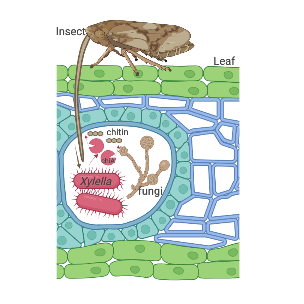______________
Decoding the Chitin Signatures generated by Xylella fastidiosa

About the Project
The ability to degrade chitin is essential for the survival and colonization success of fungal and bacterial pathogens, many of which are causal agents of agronomically-important diseases. For bacterial pathogens, which lack chitin, the degradation of chitin plays a major role in opposing host-colonizing fungi and surviving in its vector, if transmitted by insects. One of the pathogens ranked in the “list of priority pests” for Europe is Xylella fastidiosa. This insect-transmitted bacterium is the cause of the OLIVE QUICK DECLINE SYNDROME (OQDS) and important for outbreaks over the past ten years. The urgency to develop an understanding how X. fastidiosa colonizes its hosts is apparent from the lack of disease control.
Our focus is chiA, because this proposed bacterial chitinase is secreted by X. fastidiosa and has been reported i) to confer utilization of chitin as a carbon source, potentially from its insect vectors and xylem-colonizing fungi, ii) to promote transmission by insect vectors, and iii) is required for systemic infection in plants.
Although chitinases have been studied since decades, we have little knowledge on substrate-structure-product-bioactivity relationships, which are key to understanding its role as virulence factors. Here, our goal is to answer two key questions: 1. How does X. fastidiosa degrade chitin? 2. What is the immunomodulatory potential of chitin oligomers produced by X. fastidiosa?
Being an important virulence factor, our overall aim is to better understand the molecular details of chiA function and clarify its role in systemic plant infection. We envisage that this knowledge could be useful for biotechnological purposes.

Principal Investigators

Prof. Dr. Silke Robatzek
Biocenter of the LMU Munich
Genetics Section
Grosshaderner Str. 2-4
82152 Planegg-Martinsried
Germany


